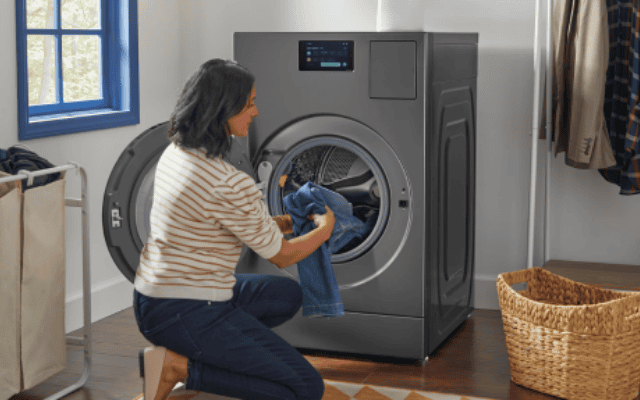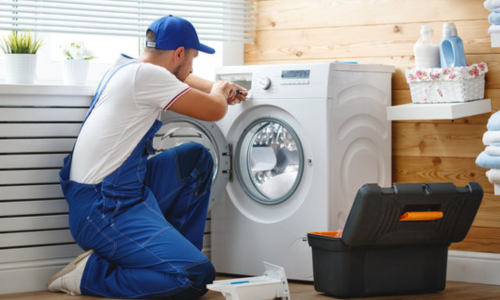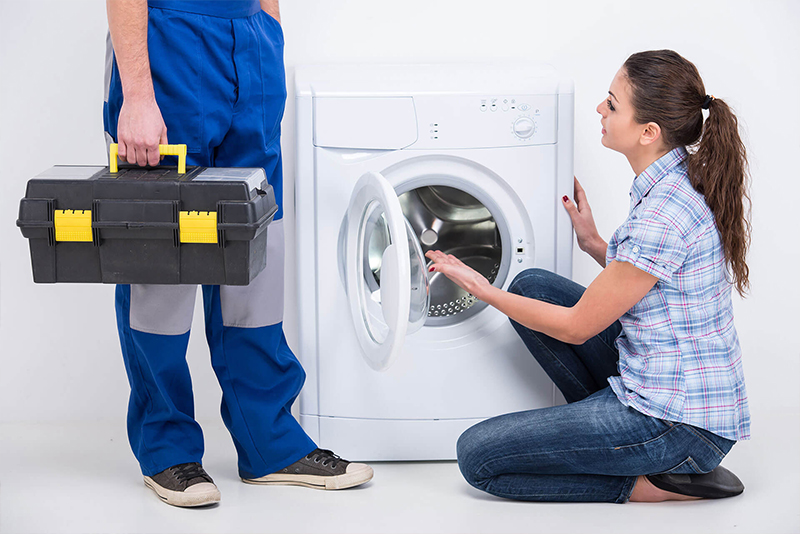Why Is My Washing Machine Leaking?

Discovering pools of water around your washing machine can quickly turn laundry day into a stressful emergency situation. Water leaks not only disrupt your daily routine but can lead to potential damage to your floors, walls, and nearby appliances. At Toronto Refrigeration, we understand how frustrating a leaky washing machine can be, especially when you’re faced with piles of dirty laundry waiting to be cleaned. Whether you have a front-load washer, top-load washer, or portable washing machine, leaks are one of the most common issues homeowners face. This comprehensive guide will help you identify the causes of washing machine leaks, provide troubleshooting tips, and explain when it’s time to call for professional washing machine repair services.
Common Causes of Washing Machine Leaks
Damaged or Loose Water Supply Hoses
One of the most frequent sources of washing machine leaks is problems with water supply hoses. Over time, these hoses can develop cracks, become loose, or deteriorate, leading to water leaks during the fill cycle. Inspect your hoses for abrasions, bulging, or signs of damage regularly.
Faulty Water Inlet Valve
The water inlet valve controls the flow of hot and cold water into your washing machine. When this component malfunctions, it may not close properly, resulting in continuous water flow even when the machine isn’t running. A washer inlet valve problem often manifests as leaking when the machine is idle.
Worn Door Seal or Gasket
For front-load washers, a damaged rubber seal around the door is a common culprit for leaks. This gasket creates a watertight barrier during the wash cycle and spin cycle. If you notice water seeping from the door during operation, examine the seal for tears, cracks, or built-up detergent residue.
Overloading the Machine
Stuffing too many clothes into your washing machine can put excess pressure on the drum and seals, forcing water to escape during the cycle. Unbalanced loads can also cause the machine to vibrate excessively, potentially loosening connections and creating leaks.
Specific Leak Issues by Washing Machine Type
Front-Load Washers Leaking Problems
Front-loading washing machines have specific vulnerabilities around the door seal and drain system. The rubber gasket around the door is particularly prone to mold buildup and deterioration if not cleaned regularly with a damp cloth. Additionally, the lower position of the drum in these models makes them more susceptible to drain pump issues.
Top-Load Washers Common Leaks
Top-loading washing machines often leak from the water inlet valve or from loose hose connections at the back of the unit. These machines may also experience tub seal failures, where water leaks from beneath the washer during the spin cycle as the seal between the outer drum and drive shaft deteriorates.

Compact Washing Machines and Portable Washers
For smaller units like compact washers or portable washing machines, leaks commonly stem from connection points where quick-connect fittings attach to household faucets. The drain hoses on these units are also frequently moved, increasing the risk of damage or improper positioning.
Diagnosing Leak Locations
Leaks from the Front of the Machine
Water appearing at the front of your washing machine typically indicates issues with the door seal for front-loaders, or problems with the detergent dispenser or fabric softener compartment. Check these areas for cracks or residue buildup that might prevent proper sealing.
Leaks from the Back of the Machine
When water pools behind your washer, inspect the water supply hoses and their connections. Loose hose connections can often be fixed by tightening them, while damaged hoses require replacement. Also check the drain hose for proper positioning and any signs of damage.
Leaks from Underneath the Washing Machine
Water accumulating under your appliance suggests more serious issues such as a faulty pump, damaged internal hoses, problems with the air dome seal, or a compromised tub seal. These internal leak sources typically require attention from experienced washer repair technicians.
Intermittent Leaks During Specific Cycles
If your washing machine only leaks during certain parts of the wash cycle, pay attention to when the leak occurs. Leaks during filling might indicate inlet valve issues, while leaks during draining could point to drain pump problems or a clogged filter.
Technical Components That Commonly Cause Leaks
Faulty Drain Pump Issues
A broken drain pump can cause dirty water to leak during the drain cycle or spin cycle. Signs of a faulty pump include unusual noises during draining or water remaining in the drum after the cycle completes. Drain pump issues often require professional repair.
Water Pump Failures
The water pump circulates water through your washing machine during the wash cycle. When this component fails, it can lead to water leaking from underneath the unit. Pump failures frequently result from foreign objects caught in the mechanism or simple wear over time.
Pressure Switch Malfunction
The pressure switch helps control water levels in your washing machine. When it malfunctions, your machine might overfill, causing excess water to leak out. A pressure decrease or complete failure can lead to both underfilling and overfilling issues.
Control Board and Electronic Problems
For modern washing machines with electronic controls, problems with the control panel or control board can cause the inlet valves to stay open longer than needed or activate at inappropriate times. These electrical issues can be complex and typically require professional diagnosis.
DIY Troubleshooting Steps
Checking and Replacing Water Supply Hoses
Inspect your water supply hoses for signs of bulging, cracking, or leaking at the connections. It’s recommended to replace rubber washers or entire hoses every 3-5 years as preventative maintenance, even if no visible damage is present.
Cleaning the Drain Pump Filter
Many washing machines have an accessible lint filter or drain plug that can become clogged with debris, causing water to back up and leak. Regular cleaning of the filter can prevent many drain-related leaks and improve machine performance.
Ensuring Proper Load Balance
Make sure you’re not overloading your washing machine, which can cause excessive vibration and water splashing. Distribute loads evenly and follow manufacturer guidelines for load size. Unbalanced loads can damage drum bearings and the drive block over time.
Using the Correct Detergent Type
Using too much detergent or the wrong type can create excessive suds that might push past seals and cause leaks. This is especially true for high-efficiency (HE) washers, which require specific low-sudsing detergents.

When to Call Professional Washer Repair Services
Signs of Serious Internal Issues
If you notice constant leaking regardless of cycle, unusual noises, or issues with the drive or heating elements, it’s time to call a professional. These symptoms often indicate more complex problems that require specialized tools and expertise.
Water Damage Concerns
When a leak has caused or might cause water damage to your home, seeking emergency washer repair service is crucial. Quick response from a professional technician can prevent costly repairs to your home’s structure.
Repair vs. Replacement Considerations
For older machines experiencing multiple issues, consult with a repair technician about whether repair or replacement is more cost-effective. An experienced repair technician can provide guidance based on the machine’s age, the average cost of repairs, and the specific problem.
Warranty Coverage Questions
If your washing machine is still under warranty, professional repairs might be covered at no or minimal cost to you. Always check your warranty documentation before attempting DIY repairs, as this might void coverage.
Why Choose Toronto Refrigeration for Your Washer Repair
Expert Technicians for All Major Brands
Our skilled technicians are factory-trained to work on all major brands and machine brands including Jenn Air and Magic Chef. Whether you have top-loading washing machines, front-load washers, or specialized laundry appliances like laundry centers, we have the expertise to help.
Same-Day Repair Options
We understand that a broken washing machine creates an urgent situation. That’s why we offer same-day washing machine repair services and emergency repair options. Our same-day service ensures you won’t be stuck with loads of laundry and no working machine.
Comprehensive Diagnostic Process
Our professional technicians don’t just fix the obvious issue—they conduct a thorough inspection to identify underlying problems. This approach prevents repeat failures and ensures that minor issues don’t develop into expensive repairs down the road.
Guaranteed Quality Repairs
We stand behind our work with a 90-day workmanship warranty on all repairs. For added peace of mind, we offer an optional extended 12-month warranty on parts and labor, demonstrating our commitment to excellence and customer satisfaction.
Toronto Refrigeration’s Service Advantages
Licensed and Experienced Technicians
All our appliance repair technicians are licensed, insured, and have extensive experience with washing machine repair services, as well as dryer repair and dishwasher repair. We also service gas appliances with special attention to safety protocols.
Transparent Pricing Structure
We provide upfront estimates before beginning any repair process, with no hidden fees or surprise charges. Our service call charge is competitive, and we offer a special discount for seniors and online customers who book through our website.

Commitment to Customer Satisfaction
Our exceptional customer service has earned us outstanding customer reviews across Toronto and surrounding areas like Maple Ridge and British Columbia. We work at your convenient time and strive to exceed expectations with every service call.
Comprehensive Service Options
Beyond washing machine repair, we offer maintenance services for all major appliances in your home. Our experienced technicians can handle everything from a broken drain pump to complex electrical issues with your control panel or lid switch.
Preventing Future Washing Machine Leaks
Regular Maintenance Recommendations
Implement a regular maintenance schedule that includes checking hoses, cleaning filters, and inspecting seals. These simple steps can prevent many common issues and extend the life of your washing machine.
Proper Loading and Operation Techniques
Follow manufacturer guidelines for load sizes, detergent usage, and machine operation. Using the Extra Power feature appropriately and not forcing the lid switch can prevent unnecessary strain on components.
When to Replace Aging Components
Even with excellent care, components like hoses, rubber seals, and damper pads will eventually wear out. Proactively replacing these items before they fail can prevent leaks and more severe damage to your machine.
Professional Maintenance Services
Consider scheduling annual preventative maintenance with our expert repair services team. This can identify potential issues before they cause leaks or breakdowns, saving you time and money in the long run.
Conclusion
A leaking washing machine is more than just an inconvenience—it’s a warning sign that requires prompt attention to prevent water damage and more expensive repairs. By understanding the common causes of washing machine leaks and taking appropriate action, you can minimize disruption to your laundry routine and extend the life of your appliance. Whether you’re dealing with loose hoses, a faulty drain pump, or a worn door seal, Toronto Refrigeration’s experienced technicians are ready to provide efficient repair services at a reasonable cost. Don’t let a leaky washer dampen your day—contact our washer repair specialists for reliable, professional service that will have your machine running smoothly again in no time.